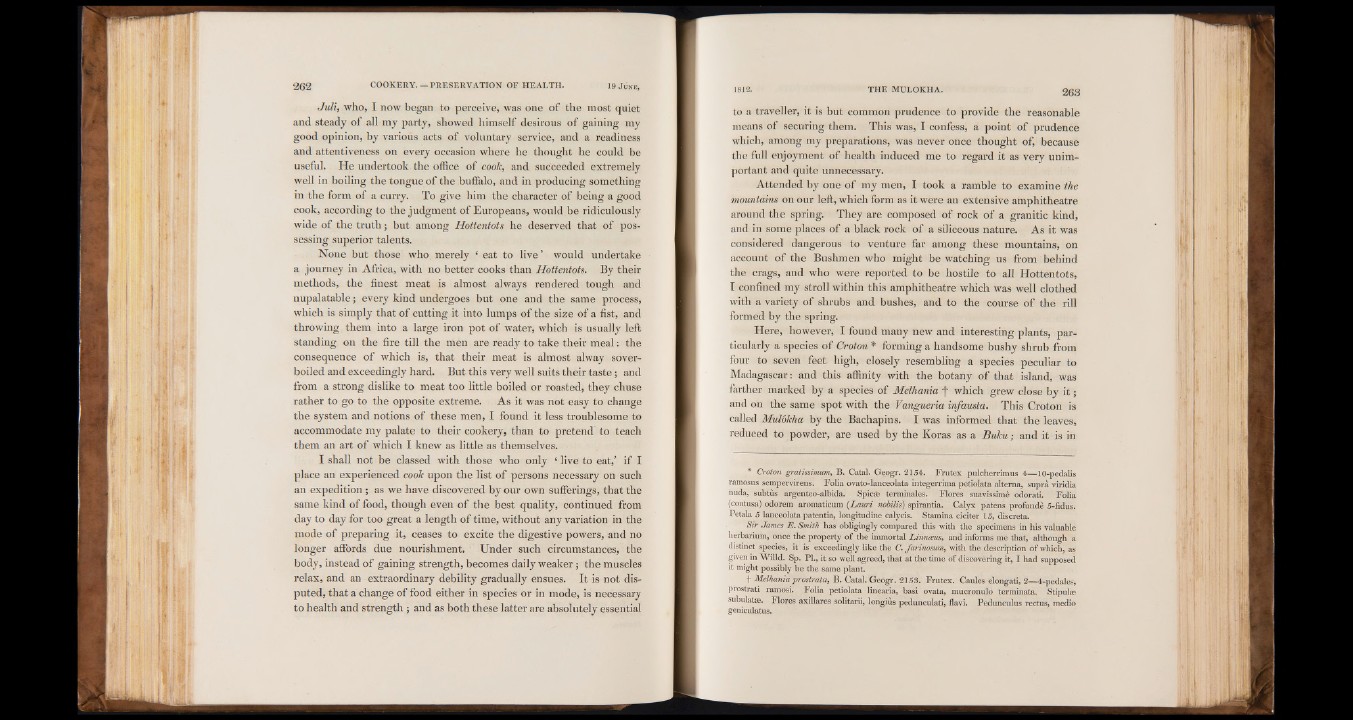
Juli, who, I now began to perceive, was one of the most quiet
and steady of all my party, showed himself desirous of gaining my
good opinion, by various acts of voluntary service, and a readiness
and attentiveness on every occasion where he thought he could be
useful. He undertook the office of cook, and succeeded extremely
well in boiling the tongue of the buffalo, and in producing something
in the form of a curry. To give him the character of being a good
cook, according to the judgment of Europeans, would be ridiculously
wide of the truth; but among Hottentots he deserved that of possessing
superior talents.
None but those who merely § eat to live ’ would undertake
a journey in Africa, with no better cooks than Hottentots. By their
methods, the finest meat is almost always rendered tough and
nupalatable; every kind undergoes but one and the same process,
which is simply that of cutting it into lumps of the size of a fist, and
throwing them into a large iron pot of water, which is usually left
standing on the fire till the men are ready to take their meal: the
consequence of which is, that their meat is almost alway sover-
boiled and exceedingly hard. But this very well suits their taste; and
from a strong dislike to meat too little boiled or roasted, they chuse
rather to go to the opposite extreme. As it was not easy to change
the system and notions of these men, I found it less troublesome to
accommodate my palate to their cookery, than to pretend to teach
them an art of which I knew as little as themselves.
I shall not be classed with those who only ‘ live to eat,’ if I
place an experienced cook upon the list of persons necessary on such
an expedition; as we have discovered by our own sufferings, that the
same kind of food, though even of the best quality, continued from
day to day for too great a length of time, without any variation in the
mode of preparing it, ceases to excite the digestive powers, and no
longer affords due nourishment. Under such circumstances, the
body, instead of gaining strength, becomes daily weaker; the muscles
relax, and an extraordinary debility gradually ensues. It is not disputed,
that a change of food either in species or in mode, is necessary
to health and strength ; and as both these latter are absolutely essential
to a traveller, it is but common prudence to provide the reasonable
means of securing them. This was, I confess, a point of prudence
which, among my preparations, was never once thought of, because
the full enjoyment of health induced me to regard it as very unimportant
and quite unnecessary.
Attended by one of my men, I took a ramble to examine the
mountains on our left, which form as it were an extensive amphitheatre
around the spring. They are composed of rock of a granitic kind,
and in some places of a black rock of a siliceous nature. As it was
considered dangerous to venture far among these mountains, on
account of the Bushmen who might be watching us from behind
the crags, and who were reported to be hostile to all Hottentots,
I confined my stroll within this amphitheatre which was well clothed
with a variety of shrubs and bushes, and to the course of the rill
formed by the spring.
Here, however, I found many new and interesting plants, particularly
a species of Croton * forming a handsome bushy shrub from
four to seven feet high, closely resembling a species peculiar to
Madagascar: and this affinity with the botany of that island, was
farther marked by a species of Melhania f which grew close by it j
and on the same spot with the Vangueria infausta. This Croton is
called Mulokha by the Bachapins. I Was informed that the leaves,
reduced to powder, are used by the Koras as a Buku; and it is in
* Croton gratissimum, B. Catal. Geogr. 2154. Frutex pulcherrimus 4— 10-pedalis
ramosus sempervirens. Folia ovato-lanceolata integerrima petiolata alterna, suprà viridia
nuda, subtùs argenteo-albida. Spiede terminales. Flores suavissimè odorati. Folia
(contusa) odorem aromaticum (Lauri nóbilis) spirantia. Calyx patens profonde 5-fidus.
Petala 5 lanceolata patentia, longitudine calycis. Stamina ciciter 15, discreta.
Sir James E . Smith has obligingly compared this with the specimens in his valuable
herbarium, once the property of the immortal Linnaeus, and informs me that, although a
distinct species, it is exceedingly like the C. farinosum, with the description of which, as
given in Willd. Sp. PI., it so well agreed, that at the time of discovèring it, I had supposed
it might possibly be the same plant.
f Melhania prostrata, B. Catal. Geogr. 2153. Frutex. Caules elongati, 2—4-pedales,
prostrati ramosi. Folia petiolata linearia, basi ovata, mucronulò terminata. Stipula?
subulatae. Flores axillares solitarii, longiùs pedunculati, flavi. Pedunculus rectus, medio geniculatus.